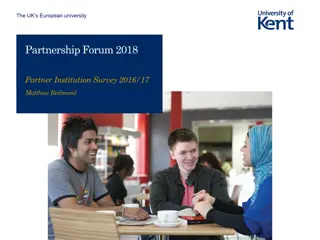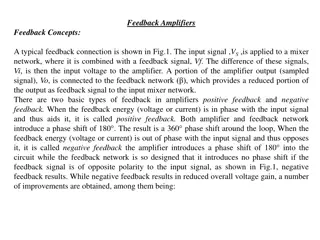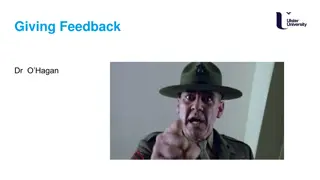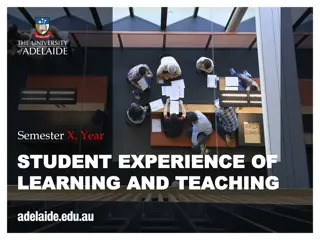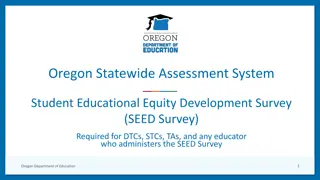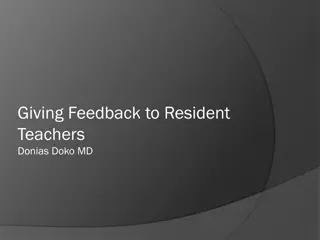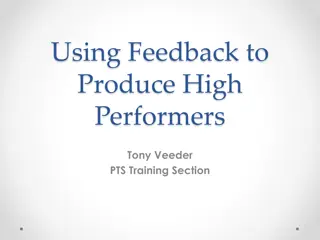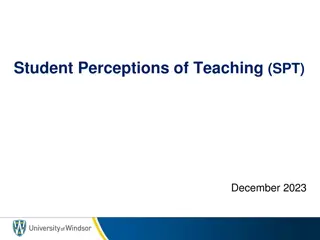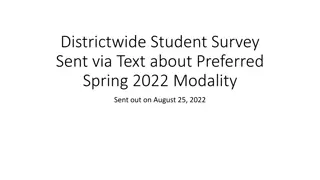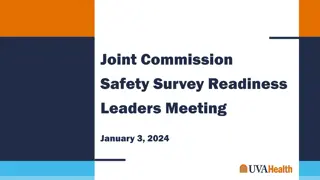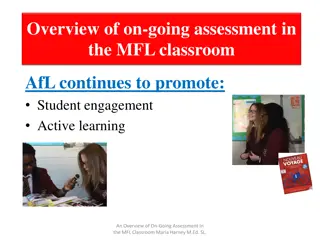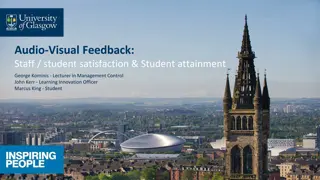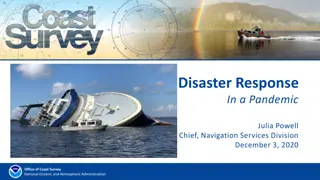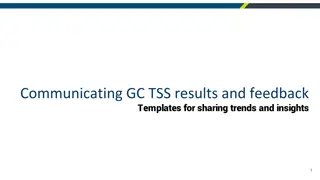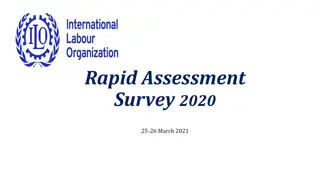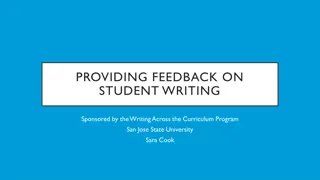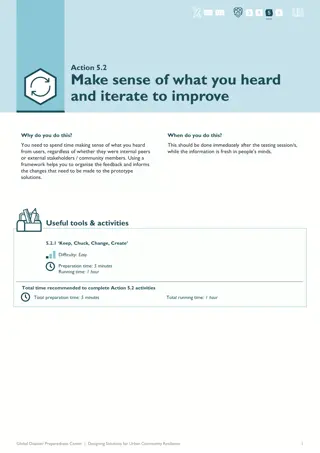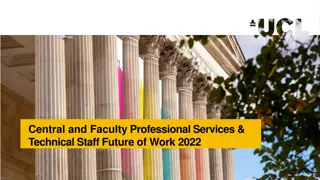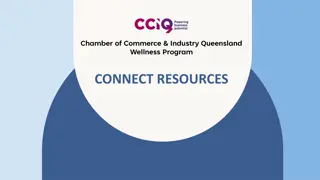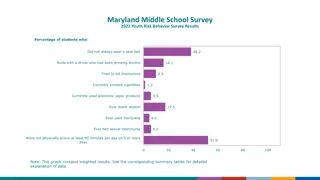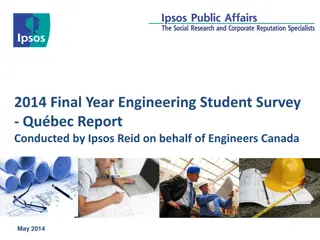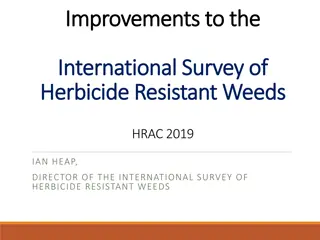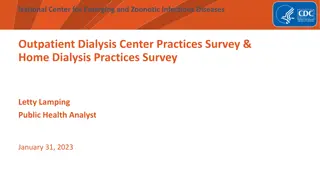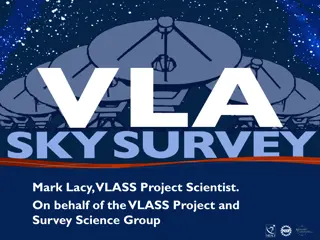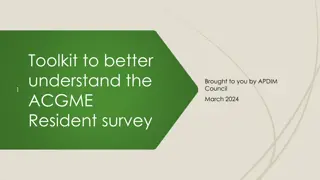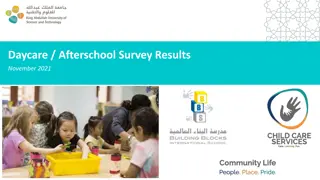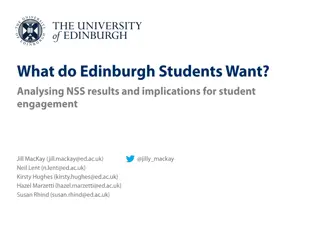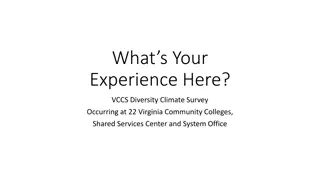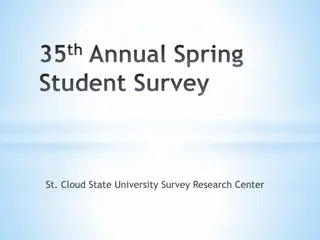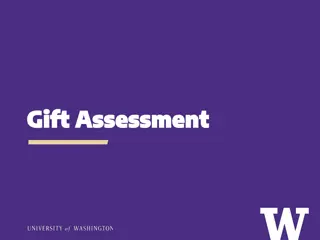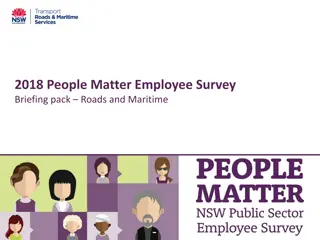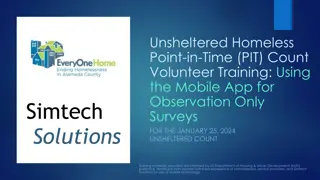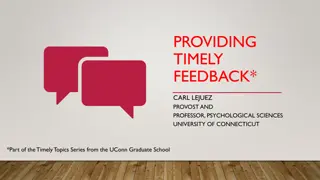Assessment Experience Survey: University of Roehampton Students' Feedback
In a survey conducted at the University of Roehampton, students shared their assessment experiences and preferences. The survey revealed the distribution of undergraduate and postgraduate students, their age groups, and the assessment formats they have experience in. Students expressed interest in trying new assessment forms such as blogs and student conferences, while showing reluctance towards recitals and wiki/websites. Feedback included a desire for clearer guidelines and challenges related to creative tasks under limited guidance. Affective issues as a learner were also highlighted.
Download Presentation

Please find below an Image/Link to download the presentation.
The content on the website is provided AS IS for your information and personal use only. It may not be sold, licensed, or shared on other websites without obtaining consent from the author. Download presentation by click this link. If you encounter any issues during the download, it is possible that the publisher has removed the file from their server.
E N D
Presentation Transcript
http://www.yorksj.ac.uk/images/hea-logo-large.jpg TAPS Student Assessment Experience Survey Spring 2014 Academic Enhancement Department
The assessment survey sample 100 University of Roehampton students 64% local undergraduate students, 15% international undergraduate students, 11% local postgraduate students and 10% international postgraduate students 50% are 17-21 years old, 42% 22-30 years old and 8% over 30 years old.
Assessment formats in use Assessment formats in use 88% of students have plenty of experience in essay- writing, 50% in group tasks and 43% in giving presentations 63% have not tried making a podcast, 62% have not made a video and 52% have not participated in a symposium/student led discussion 42% have never heard of patchwork texts, 19% of e-portfolios and 10% of building a wiki/website
What forms of assessment do students want to try? blog (20%) student conference (20%) symposium/ discussion led by students (17%) DVD/video (16%), podcast/audio recording (13%) What forms of assessment do students NOT want to try? wiki/website (31%) DVD/video (25%) audio/podcast (21%) recital/performance (19%) blog (13%)
What the students told us What the students told us
Better advice and guidelines Please give us clearer guidelines of expectations. I was not confident as to whether my work was what was expected. Clearer outlines were needed. I struggle with creative tasks, particularly when there is very little guidance on expectations.
Affective issues as a learner Although it was a really difficult assignment, the results were also the most rewarding. Just because I found it hard doesn't mean it wasn't worthwhile. Production under immediate, time- and resource-limited pressure is something I do not handle well.
Timing of assessments? I think too many assessments are squeezed into two semesters; I have nothing at all in my summer term. It's hard as you have to find information to put on the website, but also have to learn how to make a website!!!! More possibilities to hand in work before essays are due
Employability Remember there is a real world outside of the bubble of university, assessment should be about key skills. There may be some worthwhile theory to be consider, but essays do not show how good a teacher someone will be. I just really want to learn how to build a website, they can be really useful in promoting work etc.
Grading scheme The grading system is confusing, with some teachers the highest result a student can get is 70% and with others it's 80% or 95%. Looking at similar pieces online of work is really useful, and using them to stimulate our own ideas The grading system isn't clear- for ages I didn't know how to meet my overall grade after I had done badly on some essays
Range of choices Teachers should try to vary the assessment formats, not always writing based. Assessments should be much more engaging. ..there should be more freedom. It doesn t matter how we are assessed, if it has something to do with the topic, it makes us learn more about the topics that really fascinate us.
Discussion: What do you think? Discussion: What do you think? What would students on your course say? What would students on your course say? How can we improve our assessment practices? How can we improve our assessment practices?
Formative Formative or Summative Summative Assessments? Reflective: Internally defined criteria/ goals Diagnostic: Identify areas for improvement & development Flexible: Adjust as problems are clarified Absolute: Strive for ideal outcomes Cooperative: Learn from each other, develop academic skills Prescriptive: Externally imposed standards Judgmental: Arrive at an overall grade / score Fixed: To reward success, punish failure Comparative: Divide better from worse Individual effort: Student solely responsible for achievement
Summary of Differences Formative assessment Summative Dimension of Difference Timing Throughout the course End of course Focus of measurement Process-Oriented Product-Oriented Relationship between faculty and student Reflective Prescriptive Findings / uses Diagnostic Judgmental Modifiability of criteria Flexible Fixed Standards of Measurement Absolute, individual Comparative Purpose Cooperative, developmental Competitive
Five Assessment Principles (after Thomas Angelo & Patricia Cross 1993) The best assessment derives from teachers questions about their own teaching ( what are my students learning?) To improve their teaching, faculty must define learning outcomes and accurately measure their attainment To improve their learning, students must learn how to use feedback to assess their own progress ( self- assessment or peer assessment). Systematic assessment can be an intellectually challenging source of faculty satisfaction Assessment provides an impetus for active student involvement, a proven best practice .
Thanks for participating! Thanks for participating! g.bohane@roehampton.ac.uk b.middlemas@roehampton.ac.uk


